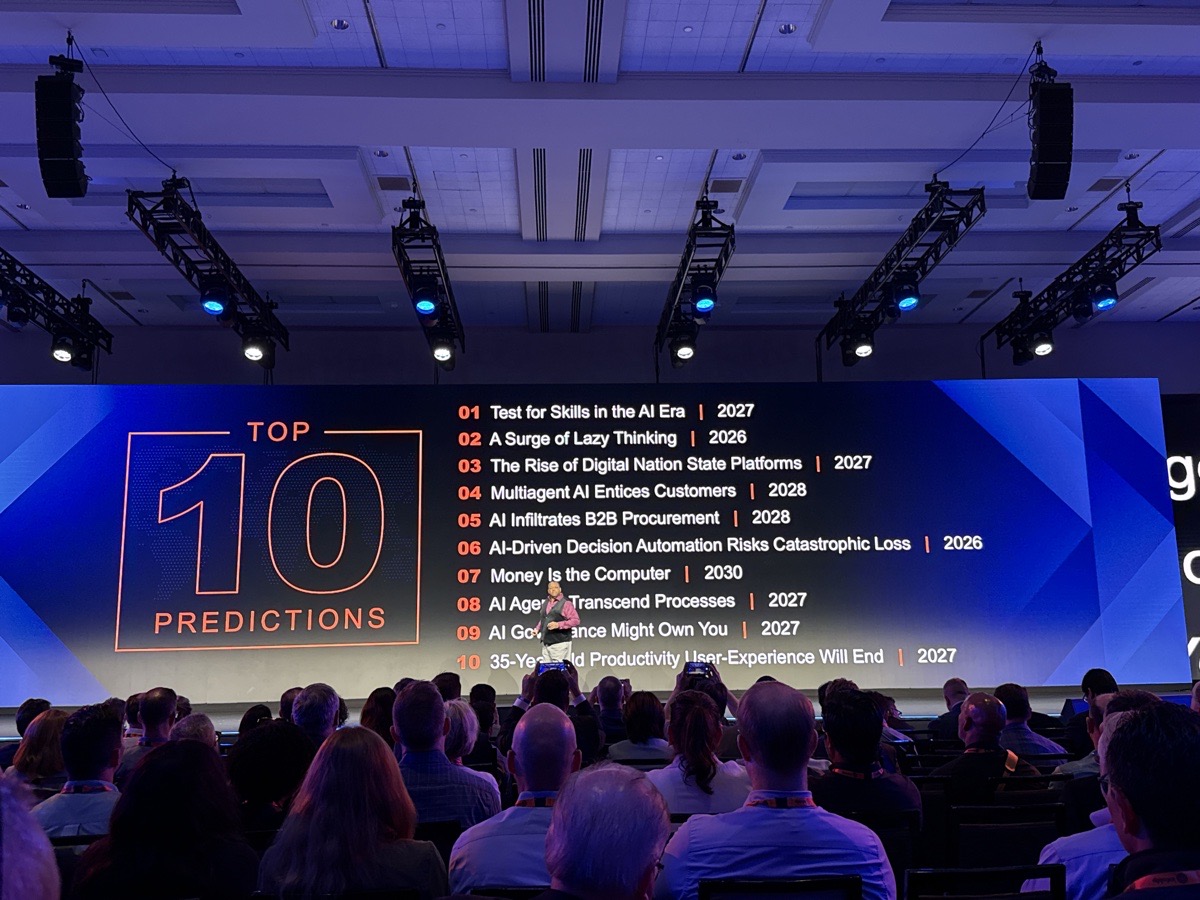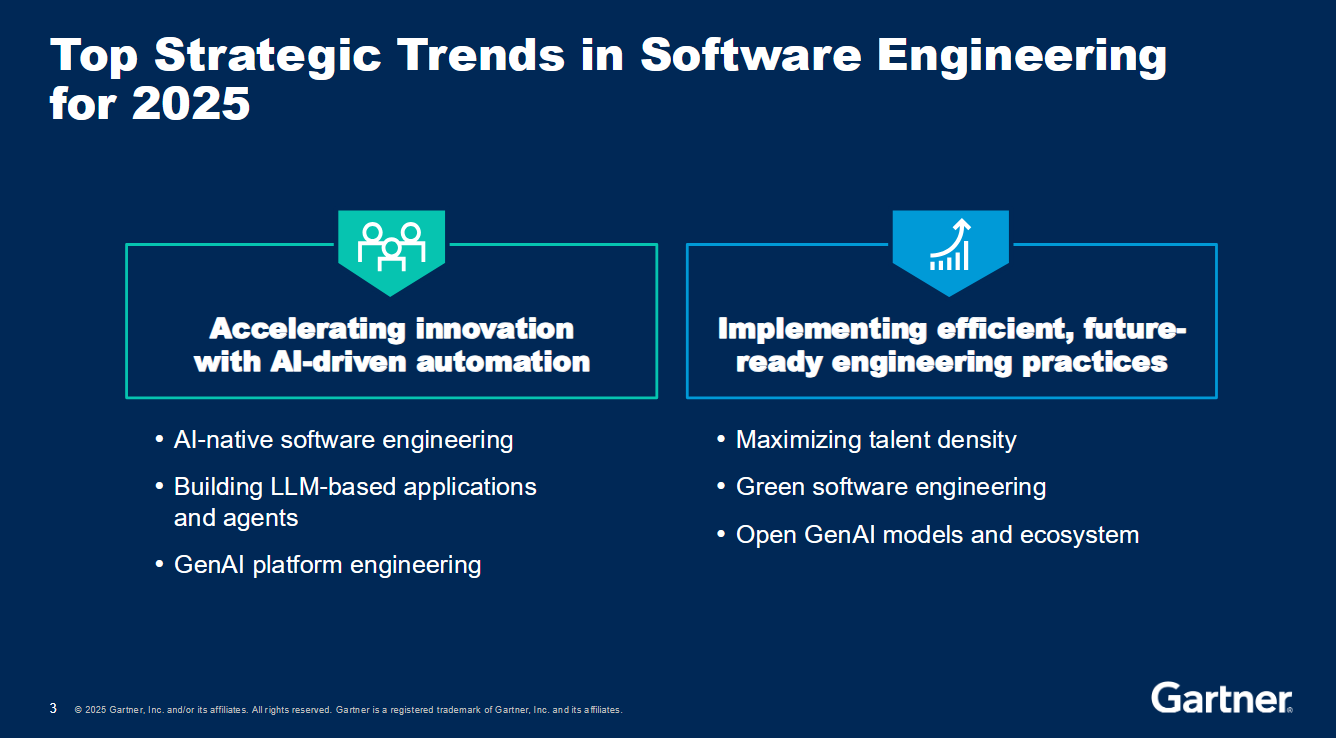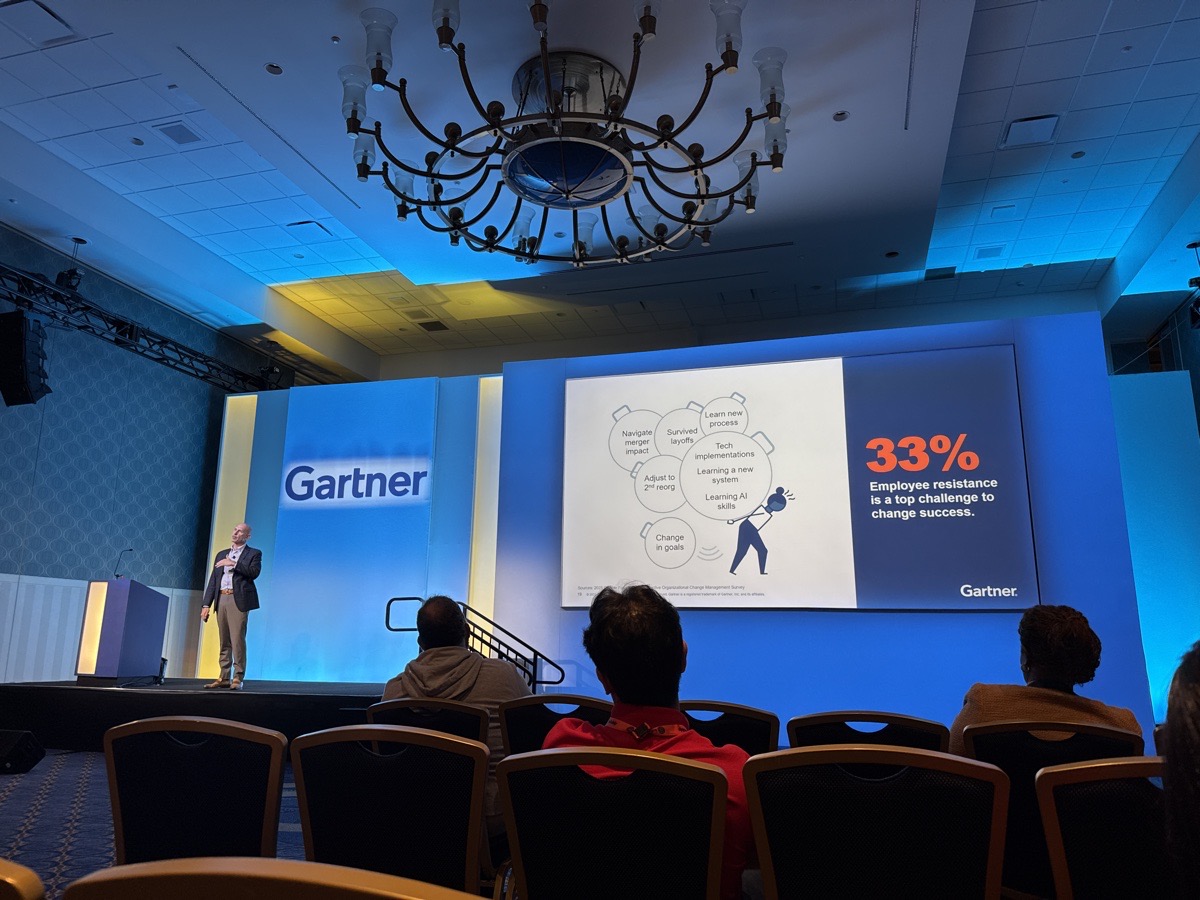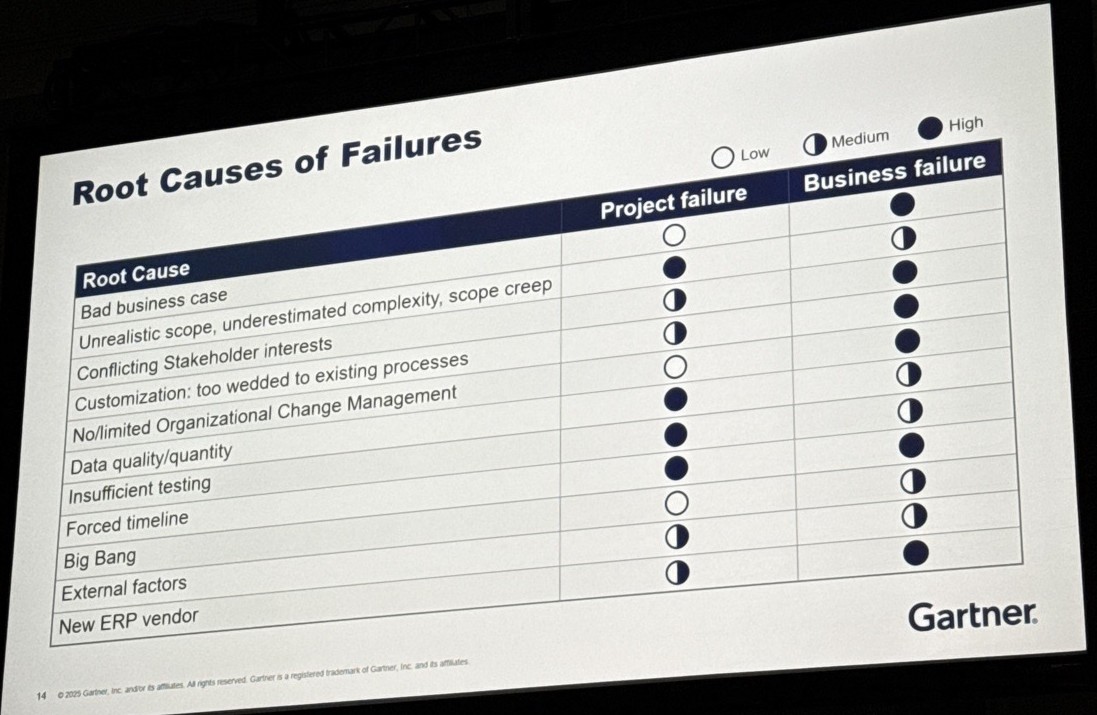Reflections from the Gartner IT Symposium/Xpo™ 2025 in Orlando
Gartner IT Symposium/Xpo™ 2025 in Orlando – Key Insights
DAY 1
The opening of the Gartner IT Symposium/Xpo™ 2025 delivered a powerful message: AI only generates sustainable value when guided by human discernment.
In the keynote “Walking the Golden Path to Value,” Alicia Mullery and Daryl Plummer presented the idea of the “golden path” — a journey to capture and preserve value in a world where AI advances faster than organizations can adapt. “Bring your own precision,” Mullery emphasized, warning that blind trust in algorithms remains a significant risk.
Among the highlights was the discussion around AI Agents. While 17% of CIOs already use them and 42% plan to do so within the next year, most are still focused on simple, conversational use cases. Gartner predicts the next leap will come from agents that make decisions and act autonomously, ushering in a new stage of intelligence. This shift will demand fresh governance standards, ethical safeguards, and new metrics for evaluating success.
The speakers also explored what they called the “transition mortgage” — the growing cost of AI transformation. The initial investment may appear reasonable, but expenses expand quickly through training, change management, and the continuous need for reliable data. Mullery advised organizations to develop an “accuracy toolkit” — systems that validate models, monitor outputs, and foster a culture of continuous learning.
Plummer also addressed the emerging geopolitics of artificial intelligence. Companies like Microsoft, Google, and Amazon are evolving into “digital nations,” controlling vast amounts of global data and infrastructure. “Choosing your AI provider,” he said, “is like entering a lifelong partnership with deep implications.” Every technology decision, in this sense, also represents a question of sovereignty.
The message from day one was clear: in the age of AI, progress isn’t about moving faster — it’s about moving with purpose. The organizations that will lead are those that combine precision, governance, and human intention.
DAY 2
Top strategic predictions for 2026+: how AI will redefine decisions, economy, and productivity

Source: Gartner presentation at Gartner IT Symposium/Xpo™ 2025.
The second day of the Gartner IT Symposium/Xpo™ 2025 in Orlando offered a provocative view of what lies ahead. In the keynote “Top Strategic Predictions for 2026 and Beyond,” Daryl Plummer, Gartner Fellow and senior analyst, outlined ten predictions for a future in which AI not only supports decisions but begins to make them — reshaping industries and economies.
Some of these predictions include:
-
Testing human skills in the AI era (2027)
-
A surge of lazy thinking (2026)
-
Digital nation-state platforms (2027)
-
Autonomous multiagent systems (2028)
-
AI in B2B procurement (2028)
-
Decision automation risks (2026)
-
Programmable money (2030)
-
Agents beyond processes (2027)
-
AI-driven governance (2027)
-
The end of the 35-year productivity model (2027)
Plummer warned that overreliance on AI could weaken critical thinking. By 2026, half of companies worldwide will assess employees’ cognitive skills, and by 2027, most hiring processes will include AI proficiency tests — making technological literacy a key competitive skill.
Another striking insight was the rise of sovereign AI ecosystems. By 2027, 35% of nations will align with regional platforms, forming digital blocs dominated by the U.S., China, and the European Union. This division will force organizations to balance independence, interoperability, and data protection in their technology choices.
Plummer also forecasted the rise of autonomous AI agents — systems that can learn, negotiate, and buy without human intervention. By 2028, these agents could handle up to 80% of B2B transactions, moving over $15 billion annually. Businesses will need to adapt marketing, procurement, and governance to remain “readable” to these digital intermediaries.
He also pointed to a coming shift in finance: “money will become the computer.” By 2030, 20% of financial transactions will be programmable, embedding conditions and rules directly into value exchange. This promises agility but also introduces new challenges in compliance and control.
Finally, Gartner anticipates a major transformation in productivity. The user experience model that has shaped workplaces for 35 years will be replaced by AI-first interfaces, requiring new forms of collaboration, management, and creativity.
The conclusion from day two: the future won’t be defined by technology itself, but by the human ability to choose what stays under our control. AI will not replace us — it will amplify what we decide to become.
Top software engineering trends for 2025
Also on day two, Gartner analyst Arun Batchu presented the main trends in software engineering for 2025, emphasizing how AI is transforming the discipline from the inside out. The focus now is on AI-native engineering, where artificial intelligence is embedded throughout the software lifecycle — from design to deployment.
Main trends include:
-
AI-native software development: applications built with AI as a core component, supporting design, coding, and decision-making.
-
GenAI platform engineering: internal platforms that unify tools, governance, and model management with security and efficiency.
-
LLM-based applications and agents: systems powered by large language models, capable of complex reasoning and autonomous execution.
-
Green software engineering: sustainable practices that optimize energy and resource use.
-
Open AI ecosystems: collaborative and interoperable models that reduce costs and democratize innovation.
-
Talent density: smaller, high-performing teams focused on impact and creativity.
-
AI-augmented pipelines: automated testing, code review, and integration using AI tools.
-
Intelligent observability: data-driven monitoring for improved performance and reliability.
-
Model governance and trust: continuous validation and transparency in AI operations.
-
Experience-driven design: human–machine co-creation as the foundation for product development.
Gartner concluded that the future of software engineering will rely on three principles: AI-powered innovation, operational excellence, and sustainable technology. The era of AI-native development has begun — and the companies that embrace it will lead the next wave of digital evolution.

Source: Gartner presentation at Gartner IT Symposium/Xpo™ 2025.
Leading with purpose in the age of the agentic enterprise
Marc Benioff’s keynote brought a human perspective to the AI discussion, reminding the audience that leadership in the digital age begins with values—not algorithms. He spoke about Salesforce’s “Ohana” culture, rooted in trust, giving back, and community, and how these principles have guided the company since its inception.
Benioff introduced his leadership model, V2MOM (Vision, Values, Methods, Obstacles, Measures), as a framework for clarity and execution in uncertain times. He described the emergence of the agentic enterprise, where humans and AI agents collaborate seamlessly across every business area—from sales to service. Yet, his message went beyond technology. He emphasized that success depends on balance, trust, and empathy, urging leaders to remember that innovation has little meaning if it doesn’t elevate the human experience.
Building enterprise AI literacy: practical lessons from CIOs
In her session, Alicia Mullery explored how to turn AI literacy from a training checklist into a company-wide movement. Her first recommendation: never assume adoption will happen naturally. Instead, design shared learning experiences—such as a one-hour-per-week program—paired with real recognition or small rewards to keep momentum.
She suggested creating “tech talk” videos, peer champions, and simple dashboards to track visible progress. Executives, she noted, need a deeper understanding of AI’s implications for cost, value creation, and business model evolution. Managers, meanwhile, must be equipped to translate uncertainty into action and lead conversations about impact and opportunity.
Mullery’s final takeaway: AI success is a shared responsibility. By establishing cross-functional councils that include HR, finance, and operations, companies can ensure strategy, governance, and adoption evolve together. And beyond measuring technical output, she advised tracking readiness, confidence, and perception of leadership to capture the true maturity of AI literacy.
The AI-powered team: rethinking how humans and machines work together
This session, featuring leaders from Agile Inc. and Venturus, examined how AI is reshaping collaboration, delivery, and performance. The speakers agreed that the future of work isn’t about replacing humans—it’s about blending human creativity with machine precision.
Agile Inc. showed how AI insights allow leaders to move beyond dashboards, predicting risks, identifying bottlenecks, and prioritizing the few actions that create the greatest impact. Venturus, sharing an engineering perspective, stressed that while AI tools accelerate coding, testing, and reviews, human judgment remains irreplaceable in architecture and design decisions.
Both organizations concluded that AI’s value comes when teams learn to trust it as a collaborator, not a shortcut. When designed this way, AI-human partnerships reduce effort, enhance delivery speed, and enable organizations to work smarter—not just faster.
Building a data strategy for the agentic AI era
Tom Godden’s keynote reframed the conversation on data. His advice: stop chasing volume and start pursuing value. Using Formula 1 as a metaphor, he said, “Every gram on the car must earn its place—your data should too.”
He proposed treating data as products with clear ownership and measurable business outcomes. Before collecting anything new, teams should ask four questions:
-
Which customer decision will this improve?
-
How will value be measured?
-
What’s the simplest route to achieve it?
-
Will it make us faster?
Godden emphasized the need to restructure collaboration—pair domain experts with data specialists and centralize only when it increases speed. He advised keeping governance lean: protect the truly sensitive, open the rest, and maintain transparent lineage. Also, it’s important to break down silos to facilitate such collaborations and foster an innovation culture. Finally, he encouraged organizations to evolve from batch reporting to automated, real-time flows, converting a few critical processes first and treating strategy as a living, adaptive practice.
Navigating change as a new CIO
Shawn Murphy’s talk focused on the leadership mindset required for new CIOs stepping into transformation roles. His first rule: don’t rush. Take time to understand the landscape, observe who holds real influence, and map out four groups—allies, skeptics, quiet supporters, and low-impact voices.
Murphy advised building trust with champions, addressing skeptics with transparency, and investing energy where it truly matters. Before initiating large-scale change, stabilize operations and clearly define the “why,” not just the “what.” Small, visible wins help build momentum and credibility.
He warned against common traps: moving too fast, prioritizing efficiency over outcomes, and overlooking mid-level managers who sustain the message. “Culture,” he said, “is your hidden infrastructure—ignore it, and every plan will fracture.”
His closing insight captured the essence of transformation: progress doesn’t come from one bold move, but from steady alignment and authentic leadership. The CIO who listens first and leads with clarity is the one who turns disruption into lasting evolution.
DAY 3
Adaptive change management: how leaders evolve in an era of constant disruption

The third day of the Gartner IT Symposium/Xpo™ 2025 left a clear message: change is no longer an event—it’s the new normal. Gartner revealed that employees now face more than 20 changes a year on average, yet only 39% of organizations manage to scale transformation effectively when disruption hits.
Analyst Shawn Murphy introduced the concept of Adaptive Change Management, a model inspired by agile frameworks and NASA’s “plan-as-you-go” mission strategy used in the Mars rover project. Rather than building long-term change roadmaps, this approach structures transformation into short, 30-day “change sprints”, where teams continuously monitor resistance, capture feedback, and refine their strategies in real time.
Murphy highlighted that one in three leaders identifies employee resistance as the main obstacle to successful change—often rooted in past negative experiences and emotional fatigue. To overcome this, organizations must cultivate “change reflexes”: behavioral skills that help individuals recognize emotional triggers, redefine their professional identity, and adapt to the new.
Among these reflexes are recognizing what’s being lost, embracing new experiences, and detecting signals of successful adaptation. Companies that train these reflexes are 1.7 times more likely to achieve sustainable change adoption.
Real-world cases from Sanofi and Novartis demonstrated that treating transformation as an evolving product—built through sprints, continuous feedback, and engagement metrics—helps maintain trust and reduce the emotional toll of disruption.
The takeaway: successful change isn’t about one big transformation—it’s about learning to transform continuously.
ERP modernization: why so many projects fail—and how to make them succeed
To close day three of the Gartner IT Symposium/Xpo™ 2025, analysts turned to one of the most challenging transformations of all: ERP modernization. These are typically the largest and riskiest initiatives CIOs will ever lead—programs that demand not only technical expertise but also a deeply business-oriented mindset.

According to Gartner, one in four ERP projects ends in critical failure, sometimes resulting in financial losses, customer churn, or even bankruptcy. Common causes include overpromised ROI, underestimated total cost of ownership, unnecessary customization, unrealistic timelines, and poor testing discipline.
The analysts were emphatic: ERP transformations are business transformations. True ownership should rest with the CEO, CFO, or COO, while CIOs act as facilitators and technical stewards.
Another critical reminder: going live doesn’t mean success. Real success comes from adoption and measurable business impact, tracked through SMART goals—specific, measurable, and achievable metrics, such as “closing the books within five days, even during quarter-end.”
Key drivers of success include:
-
Strong executive sponsorship and alignment between business and IT;
-
Robust change management and empowered “super users”;
-
A three-in-the-box governance model, aligning client, integrator, and vendor under shared accountability;
-
Prioritizing configuration over customization (especially for 60–70% of the project scope);
-
Early focus on cutover and hypercare, guided by business outcomes instead of rigid deadlines.
Case studies from leading manufacturers and pharmaceutical companies reinforced that failures rarely result from one single issue—they emerge from a chain of small, rushed decisions. Meanwhile, successful programs treated ERP as a living system, continuously refined through agile sprints and collaborative governance.
The closing message: “If you don’t prepare, you prepare to pay.” ERP success isn’t about going live—it’s about how well it transforms the business.
Meta IT: advancing human growth with artificial intelligence
At Meta IT, we believe the future of AI is human-centered. Our team attended the Gartner IT Symposium/Xpo™ 2025 to connect with global leaders and share insights on how organizations can use AI, automation, and data to achieve real, measurable transformation. With 35 years of experience driving digital evolution, Meta IT helps companies unlock new levels of efficiency, intelligence, and human growth through technology.
Learn more at metait.ai.

